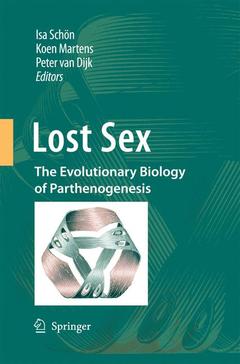Description
Lost Sex, 2009
The Evolutionary Biology of Parthenogenesis
Coordinators: Schön Isa, Martens Koen, van Dijk Peter
Language: English
Subjects for Lost Sex:
Keywords
Adaptation; Charles Darwin; Darwin; Ecology; Evolution; Genetics; Genotyp; Mutation; Parthogenesis; eukaryote; evolutionary biology
Publication date: 11-2014
615 p. · 15.5x23.5 cm · Paperback
Approximative price 242.64 €
Subject to availability at the publisher.
Add to cartPublication date: 10-2009
Support: Print on demand
Description
/li>Contents
/li>Comment
/li>
Sex is the queen of problems in evolutionary biology. Generations of researchers have investigated one of the last remaining evolutionary paradoxes: why sex exists at all. Given that sexual reproduction is costly from an evolutionary point of view, one could wonder why not all animals and plants reproduce asexually. Dozens of contemporary hypotheses attempt to explain the prevalence of sex and its advantages and predict the early extinction of fully asexual lineages.
The major theme of this book is: what is the fate of animal and plant groups in which sex is lost? Initial chapters discuss theory behind asexual life: what major disadvantages do asexual groups have to face, what are the genetic and ecological consequences and what does this theory predict for more applied aspects of asexual life, for example in agricultural pests, diseases as well as in cultural crops such as grapes. Cases studies in many animals (focusing on both invertebrates and vertebrates) and plants reveal parallel, but also singularly novel adaptations to the absence of meiosis and syngamy. And last but not least, are asexuals really doomed to early extinction or do genuine ancient asexuals exist?
This book assembles contributions from the most important research groups dealing with asexual evolution in eukaryotes. It is a milestone in research on parthenogenesis and will be useful to undergraduate as well as graduate students and to senior researchers in all fields of evolutionary biology, as the paradox of sex remains its queen of problems.
First complete update of the field since 1982
Includes theory, case studies and applied aspects of parthenogenesis
Deals with plants and both vertebrates and invertebrates
Contributes to the debate on the paradox of sex from the asexual point of view
Describes genetic and ecological consequences of asexuality
These books may interest you

The Biology of Reproduction 50.94 €

The Biology of Reproduction 114.04 €


